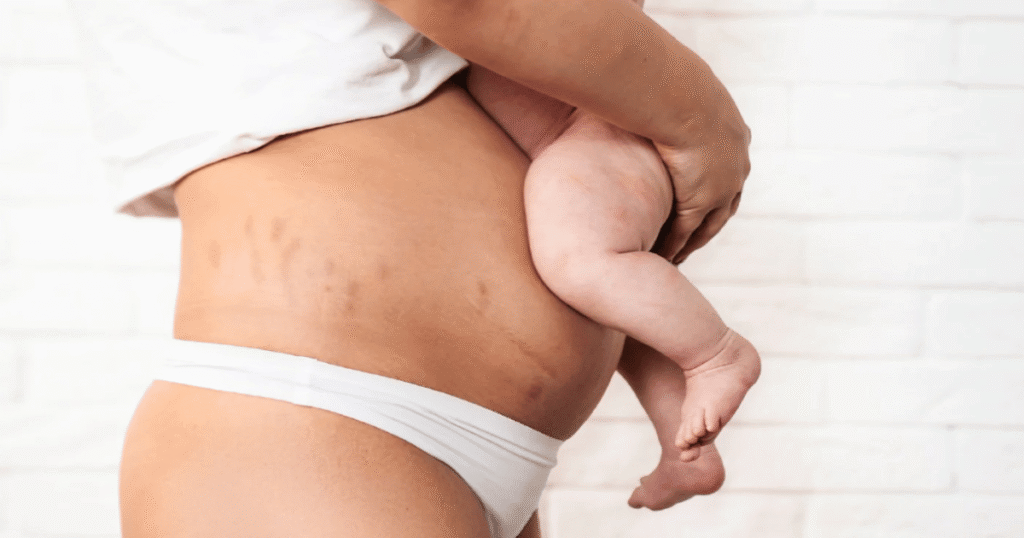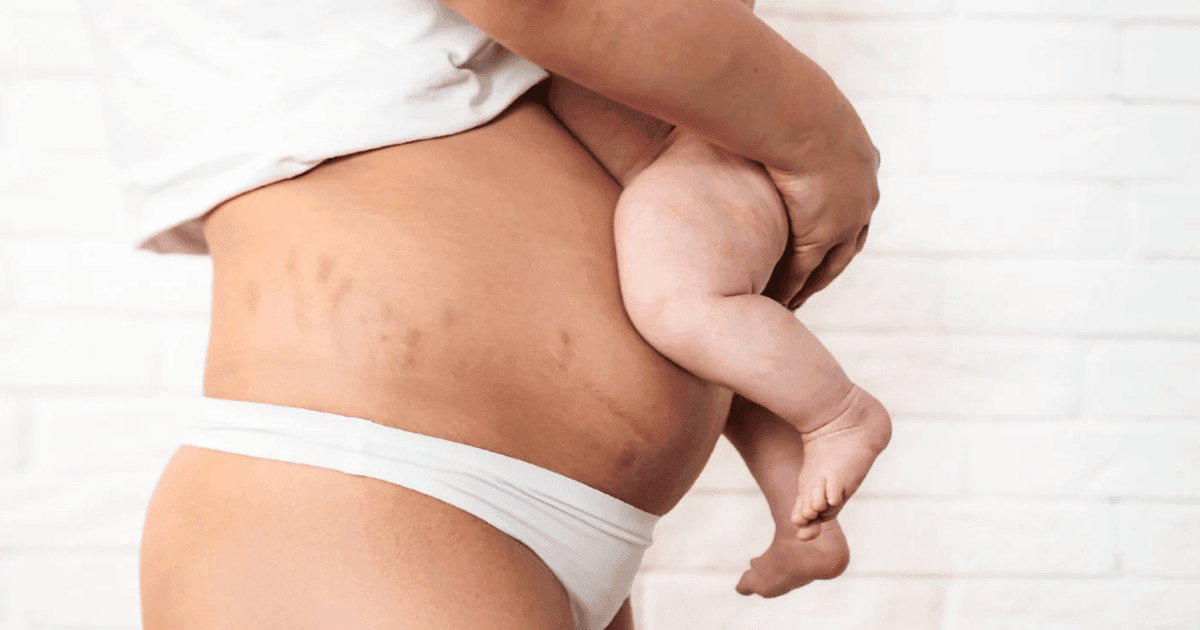

The journey through pregnancy and postpartum brings immense joy and excitement, but it also comes with challenges. As women adjust to motherhood, they may experience physical, emotional, and social changes that can feel overwhelming. Some health-related changes that occur during pregnancy and childbirth may continue after delivery, affecting the mother and sometimes the newborn. Understanding these changes is essential for a healthy transition into postpartum life.
What is Postpartum?
The postpartum period, also called the postnatal phase, begins after childbirth. It typically lasts six to eight weeks, but recovery can extend beyond this timeframe. During this stage, the body gradually returns to its pre-pregnancy state, while maternal lactation begins.
As part of recovery, the uterus clears out the remaining tissue through a natural discharge called lochia. This gradually reduces over a few weeks as healing progresses.
Following childbirth, the uterus contracts to regain its normal size. These contractions, called afterpains, can cause discomfort, and women’s tolerance levels vary. Breastfeeding helps speed up this process by reducing postpartum bleeding.
What Changes Occur in a Woman’s Body Postpartum?
During the first six weeks after childbirth, a woman’s body gradually recovers and returns to its pre-pregnancy state. This period brings several physical changes, including:
- Weight Loss: New mothers typically lose around 5–6 kg immediately after birth, which includes the baby’s weight, placenta, and amniotic fluid. Additionally, the uterus begins to shrink. Over the next few weeks, they may shed another 2–7 kg naturally.
- Hair Loss: Hormonal changes during pregnancy promote hair growth, making the hair appear thicker. However, after childbirth, hormone levels shift again, leading to hair loss. This shedding usually lasts between six to twelve months before hair returns to its normal cycle.
- Constipation: In the final trimester, many expectant mothers experience constipation, sometimes accompanied by hemorrhoids. This occurs due to the pressure of the growing uterus on major veins, restricting blood flow. After delivery, pain and discomfort may make bowel movements difficult, but this issue improves with time.
- Incontinence: Labor stretches the pelvic muscles, especially after prolonged childbirth. This can cause urine leakage when sneezing, coughing, or laughing. This condition may improve over time for some women. For additional support, some may explore devices like VTone, which are designed to help stimulate pelvic floor muscles. Always consult a qualified health practitioner before use.
- Stretch Marks: As the skin expands rapidly during pregnancy, around 90% of women develop stretch marks on their abdomen. These marks may appear pink or red, depending on skin type. While they do not disappear completely, they fade gradually over time.
- Abdominal Prolapse: The abdominal muscles stretch along with the uterus during pregnancy. Even after birth, they remain loose, just like the skin. However, with consistent exercise, these muscles can regain their firmness over time.
- Postpartum Swelling: Water retention is common after childbirth as the body works to restore fluid balance. Swelling typically subsides within two weeks as the body adjusts.
What are the Physiological Changes during Postpartum?
During the postpartum period, women also experience several psychological changes. Some common changes include:
- Stress: Lifestyle changes and lack of sleep can cause stress for new parents. The responsibility of caring for a newborn can be overwhelming, and other factors may also contribute to stress.
- Postpartum Blues: Hormonal changes can lead to mood swings and feelings of sadness or anxiety, known as postpartum blues. These feelings often occur within five days of giving birth and resolve within two weeks.
- Postpartum Depression: A more severe form of postpartum blues, postpartum depression is characterised by high levels of anxiety and depression. Symptoms may include sleeplessness, loss of appetite, tearfulness, emotional sensitivity, mood swings, difficulty bonding with the newborn, and thoughts of harming oneself or the newborn. These symptoms can last from two weeks to many months, or even years. If you or someone you know may be experiencing postpartum depression, please seek advice from a qualified health professional.
Why Postpartum Support Matters
Postpartum care is essential for a mother’s health and well-being, benefiting both her and her baby. Research highlights that comprehensive, evidence-based postpartum support not only aids immediate recovery but also has long-term positive effects.
Here’s why postpartum care is crucial:
1. Rest Supports Recovery and Reduces Depression Risk
Caring for a newborn can be physically exhausting, and extreme fatigue is a leading risk factor for postpartum depression. A study in the Journal of Obstetric, Gynecologic & Neonatal Nursing found that mothers experiencing severe fatigue by the 14th day postpartum were more likely to show symptoms of postpartum depression by the 28th day. Receiving help with diapering, feeding, and bathing the baby allows mothers to rest and focus on their recovery. Research suggests that adequate rest and support may help reduce the risk of postpartum mood disturbances.
2. Proper Nutrition Aids Healing
New mothers often prioritise their baby’s needs over their own, sometimes neglecting essential nutrition. However, consuming a well-balanced diet is crucial for postpartum recovery and milk production (if breastfeeding). The body requires extra calories, vitamins, and minerals to heal and restore hormonal balance. A balanced, nutritious diet may help support recovery and milk production in the postpartum phase.
3. Early Support Enhances Breastfeeding Success
Breastfeeding can come with unexpected challenges, such as difficulties with latching, low milk supply, or baby’s feeding patterns. Research suggests that early guidance from postpartum professionals may support breastfeeding success and confidence. Support systems help moms overcome hurdles, boost their confidence, and ensure their baby is properly nourished.
4. Newborn Care Education Reduces Anxiety and Promotes Safety
For first-time mothers, newborn care can feel overwhelming. Many assume tasks like swaddling, bathing, and feeding will come naturally, but they often require guidance. Postpartum specialists can offer helpful education and reassurance, which may assist in building confidence in infant care. Knowledge of safe sleep practices is especially critical in preventing Sudden Infant Death Syndrome (SIDS).
What is a Postnatal Retreat?
A postnatal retreat offers a structured recovery space for new mothers, providing professional care, emotional support, and lactation guidance. These retreats help ease the transition into motherhood by offering relaxation, expert advice, and assistance with newborn care. Mothers benefit from therapeutic treatments, and mindfulness sessions tailored for postpartum recovery. These retreats create an environment where women can rest, recharge, and connect with other new mothers.
At Jennifer Carly Aesthetic Medicine, we offer EvolveX—an option that uses radiofrequency and electromagnetic technology. Some women choose this non-surgical approach as part of their postnatal self-care routine. Individual results may vary, and professional consultation is recommended to assess suitability
Postnatal and Postpartum Retreat in Gawler, South Australia
Motherhood is a transformative experience, and every woman deserves to feel supported and empowered throughout her postpartum journey. Whether through aesthetic treatments, postnatal retreats, or wellness therapies, prioritising self-care enhances both physical recovery and emotional well-being.
If you’re exploring postnatal self-care options in Gawler, South Australia, book a consultation with Jennifer Carly Aesthetic Medicine to learn how we may support your journey through recovery and wellness.
